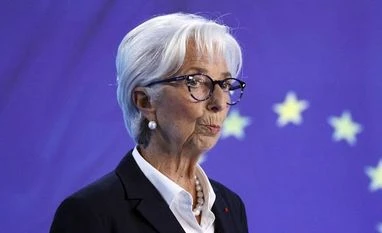European Central Bank (ECB) chief Christine Lagarde on Friday said that recovery prospects for global economy remain fragile amid continued uncertainty, fuelled by Russia's "unjustified: war against Ukraine, and the possibility that pressures in global energy and food markets may reappear, leading to renewed price spikes and higher inflation.
In her statement at the 47th meeting of the International Monetary and Financial Committee (IMFC) in Washington, she said that resilient labour markets and strong wage growth, especially in advanced economies, suggest that underlying inflationary pressures remain strong.
"At the same time, other factors that may accelerate disinflation include persistently elevated financial market tensions, falling energy prices, and a weakening of demand, owing also in part to a stronger deceleration of bank credit or a stronger than projected transmission of monetary policy," she noted.
Lagarde added that since the October 2022 meeting of the IMFC, the global economic outlook has improved on the back of a gradual easing of global supply bottlenecks, declining energy prices, and the recovery of the Chinese economy following the lifting of pandemic-related containment measures.
Global inflation has also been declining since it peaked in summer 2022, supported by easing supply constraints, as well as by the tightening of monetary policy among advanced economies, she noted.
However, emphasising on strengthening global economy, she said that the recent global shocks and geopolitical tensions have advanced the debate about reconfiguring global supply chains.
"While the increased resilience associated with less complex supply chains is desirable, a less integrated world economy also entails costs. It weakens the diversification of global production and, in particular, the efficient allocation of resources globally, which has an adverse impact on welfare across the world. Geopolitical fragmentation may also affect the global economy via financial channels," she contended.
More From This Section
The availability of external financing may be impeded, and lower foreign direct investment would hinder the diffusion of technology and thus productivity growth, the ECB chief added.
She welcomed the IMF's continued support for Ukraine, including the recently approved fully fledged lending arrangement. Together with strong international support, the arrangement will be essential for addressing Ukraine's immediate financial needs and in catalysing additional financial assistance.
"We note that all adjustments to the IMF's lending policies and toolkit are uniformly applicable to those meeting the relevant criteria from the Fund's broad membership. In view of rising debt vulnerabilities, support for vulnerable countries remains high on the international agenda. We welcome the first successful conclusion of debt restructuring under the G20-Paris Club Common Framework last year and encourage debt treatments of other applicant countries to be finalised promptly," Lagarde said.A
Focussing on European economy, she said that Russia's unjustified war against Ukraine and its people continues to be a significant downside risk to the economy and could again push up the costs of energy and food. Euro area growth could also be dragged down if the world economy weakened more sharply than expected.
"However, if companies can adapt more quickly to the challenging international environment, this, coupled with the fading-out of the energy shock, could support higher growth than currently expected... As energy prices fall and risks around the energy supply recede, it is important to start rolling back these measures promptly and concertedly. Falling short of these principles can drive up medium-term inflationary pressures, which would call for a stronger monetary policy response," Lagarde underlined.
--IANS
ans/vd
)